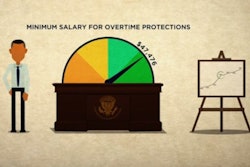As previously announced, the Department of Labor (DOL) will revise the salary test used to treat certain executive, administrative, and professional employees as exempt from overtime. The new regulations will be effective December 1, 2016.
The new minimum salary will be $913 per week or $47,476 per year. According to the DOL, this figure represents the 40th percentile of earnings of full-time salaried workers in the lowest wage Census region (the South).
The minimum salary will be adjusted (presumably upward) every three years beginning January 1, 2020 using the same 40th percentile formula. This makes the minimum almost certain to rise as workers fall out of this group because of the new regulation and the earnings of the remaining group of workers go up. DOL states that it will announce the change 150 days in advance of that date. This may become the subject of litigation, as some are predicting that the updates are subject to the Administrative Procedure Act’s Notice and Comment regulations and cannot be implemented unilaterally by DOL.
The new regulations will permit you to use a non-discretionary bonus or other incentive to meet up to 10 percent of the salary requirement, provided it is paid on a quarterly (or more frequent) basis. Really, this only lets you defer payments until the end of a quarter; you still have to meet the minimum salary requirement.
Although very rare, some contractors may employ “highly compensated” workers who do not meet any of the duties tests for an overtime exemption but are exempt based merely on their high salaries. This test is changing also. The “highly compensated” threshold will increase from $100,000 to $134,004. This figure is based on the 90th percentile of earnings of full-time salaried employees. This minimum will also be “updated” every three years.
DOL is estimating that over four million workers will no longer be exempt from overtime. Many contractors have first-line supervisors who presently are exempt as managerial employees but will not be exempt in the future because of this change in the minimum salary. Also, some contractors may have office workers who may have been exempt as managers or administrative workers but may not meet the new salary minimum. So what do you do?
- Increase salary to meet the new minimum requirement. This only makes sense if a currently exempt employee is making close to the minimum now. Note that this may require a “raise” every three years as the minimum requirement is adjusted upward.
- Change their status to nonexempt. This strategy, probably best for those who are not presently earning close to the new minimum, requires that you pay overtime for hours worked over 40 per pay period. Remember that the burden is on you to prove that someone did not work overtime. Also, you need to be concerned about first line supervisors driving time and time spent on their smart phone answering emails. You should consider adding a time clock or some other reliable method to track hours worked.
- If someone regularly works more than 40 hours per pay period, consider reducing pay so that regular rate plus “time and a half” for overtime hours comes very close to their present rate of pay. You may also want to monitor closely their actual hours worked because you will be liable for any deviations from the “base salary” you set for these workers.
At the very least, you will need to carefully look at the pay plans for all exempt workers to make certain you are in compliance on December 1. It is also important to start work on these changes sooner rather than later. This is because affected workers may resent the change from exempt to nonexempt status and feel psychologically that they are being demoted or placed in a “dead-end” job.
Regular communication with affected workers will be essential to preventing morale issues and a negative attitude toward your work or you. Of course, you can always blame the government, but the reality is that most workers will feel that you are simply saving money at their expense. Still, it will be important for you to explain to workers that the government is compelling these changes and your compliance is necessary to save jobs for everyone.







![[VIDEO] Fair Labor Standards Act Reduced Exemptions Raising Questions](https://img.forconstructionpros.com/files/base/acbm/fcp/image/2016/09/default.57ebc6d6e1e48.png?auto=format%2Ccompress&fit=crop&h=167&q=70&w=250)












